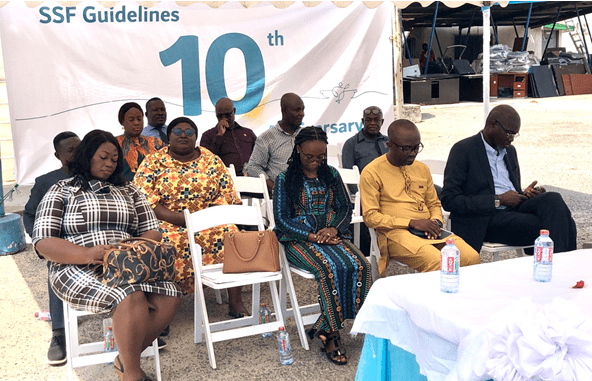By Emmanuel AKOMEA
Executive Director-Fisheries Commission, Fred Kwasi Antwi-Boadu has emphasised the crucial role of small-scale fisheries in ensuring a sustainable future for the sector.
According to him, the fisheries sector is a cornerstone of the country’s economy, directly and indirectly supporting over 10 percent of the population. He added that it provides livelihoods for coastal and inland communities and is critical to food security.
Speaking at the World Fisheries Day in Accra, he said beyond providing sustenance the sector generates significant income through fish processing and trade, creating jobs for women and youth in particular.
This year’s celebration was marked by a renewed commitment to sustainable practices and recognition of small-scale fisheries as the foundation of food security, economic development and environmental conservation.
World Fisheries Day offered an opportunity to reflect on the vital role fisheries play globally and within Ghana. Stakeholders, including the Food and Agriculture Organisation (FAO) and development partners, came together to assess progress and reaffirm commitments to sustainable fisheries management.
The Executive Director – speaking on this year’s theme ‘Blue transformation in action’ – indicated the urgent need to rethink approaches to managing fisheries and aquaculture resources.
The celebration also coincided with the Voluntary Guidelines for Securing Sustainable Small-Scale Fisheries’ (SSF Guidelines) 10th anniversary, emphasising the critical role of small-scale fisheries in reducing poverty and ensuring sustainable aquatic resource management.
Mr. Antwi Boadi indicated that over the past decade Ghana has achieved significant milestones in the fisheries sector. Collaborative efforts have led to the establishment of sustainable practices, such as implementation of a closed fishing season and a moratorium on new entrants into the artisanal fisheries sector.
These measures, he stated, aim to curb overfishing and promote resource replenishment.
Additionally, the sector has benefitted from enhanced enforcement of fisheries laws, capacity-building programmes for fishers and establishment of learning and demonstration centres.
The Minister of Fisheries and Aquaculture Development, Mavis Hawa Koomson, in a speech read on her behalf underscored the fisheries sector’s critical role in national development.
“The fishing industry provides thousands of jobs to support our livelihoods, particularly in our coastal and inland communities. Ghanaian fish and fishery products are known for their quality and diversity. They are exported to many countries around the world, with the European market being a major destination,” she said.
Senior Fisheries Officer at FAO, Regional Office-Africa, Dr. Ndiaga Gueye on his part, said: “I call upon all of us – government, fishers, community leaders, NGOs, and international partners – to embrace FAO’s blue transformation agenda to advance aquatic food systems for the prosperity and well-being of all”.
Dr. Gueye added that blue transformation presents a vision to broaden aquatic food systems and enhance their role in providing nutritious, affordable and healthy diets while promoting environmental stewardship and fostering inclusive growth – particularly for communities that rely on fisheries and aquaculture.
He called for a focus on sustainable management practices to protect aquatic resources, preserve biodiversity and ensure that future generations can continue benefitting from these vital resources.
He again indicated that small-scale fishers must be empowered with the tools, training and resources they need to operate sustainably and thrive in a changing world.










